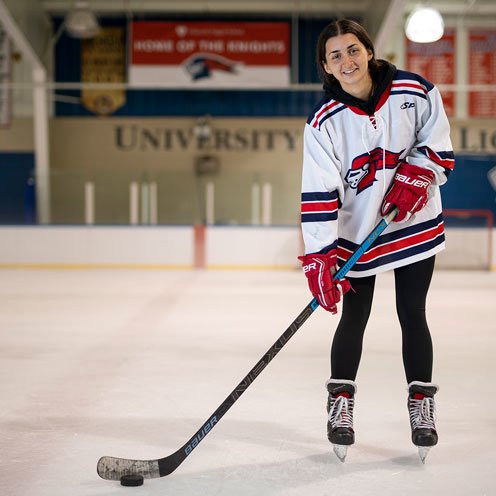Hockey Injuries
 Hockey is a high-speed, high-impact sport. Players are susceptible to a range of collision-related injuries, in addition to chronic overuse injuries. At Henry Ford Health, our sports medicine specialists care for hockey players of all skill levels. From the youth leagues to the pros, we’re here to help you heal.
Hockey is a high-speed, high-impact sport. Players are susceptible to a range of collision-related injuries, in addition to chronic overuse injuries. At Henry Ford Health, our sports medicine specialists care for hockey players of all skill levels. From the youth leagues to the pros, we’re here to help you heal.
Hockey injury causes
Pucks. Sticks. Goal posts. Blades. Hockey glass. The opportunities for traumatic injuries in hockey are almost endless. And despite protective gear, it’s not uncommon for players to sustain fractures, dislocations, concussions and other acute injuries.
While sudden injuries may be more common in hockey players, they’re still susceptible to chronic overuse injuries. Hockey players use a deep, bent-knee skating technique, pushing off with their feet for speed and power. This type of skating puts constant stress on the quadriceps, knees, hips and back.
Youth hockey players are susceptible to a different set of injuries. They have fewer traumatic injuries but may develop growth plate injuries. Growth plates are areas of tissue at the ends of bones that are still developing. Rigorous training during their growing years can lead to joint instability, muscle imbalances and problems with skeletal development.
Common hockey injuries we treat
Our sports medicine specialists treat a variety of hockey injuries, including:
- Clavicle (collarbone) fractures
- Concussions
- Femoroacetabular impingement (friction and pain in your hip joint)
- Groin and hip flexor strains
- Hip labrum tears
- Lace bite (pain at the front of your ankle due to stiff skate tongues)
- Medial collateral ligament (MCL) strains
- Shoulder separations
Hockey injury treatment
We use a range of off-ice training techniques to help hockey players recover from injuries, including:
- Agility training: We use 3D motion analysis and other testing equipment at our Center for Athletic Medicine to assess the safety of your movements. Sports medicine experts provide techniques for stopping and changing direction with less risk of injury.
- Directional rehabilitation: We help you regain balance before returning to the ice. Single-foot exercises, multidirectional squats and balance boards improve strength and stability.
- Hand-eye coordination: We provide a variety of drills to improve footwork and stickwork as you heal from an injury. Hand-eye coordination exercises help you overcome the effects of concussions and head injuries.
- Strength conditioning: We help you improve quad and back strength to take stress off your knees and hips. Another goal is to improve core strength to help you balance your pelvic tilt as you skate.
If your hockey injury requires surgical treatment, the experts at Henry Ford offer a range of advanced procedures. Whenever possible, we use minimally invasive techniques so you can recover faster and with less pain.
Hockey injury prevention
We give you tips and techniques for reducing your risk of hockey injuries, including:
- Always use safe playing techniques. Keep your head up for hits and collisions to avoid the risk of head, neck and spinal cord injuries.
- Never start a hockey season without proper conditioning.
- Vary your activities. Youth players should play multiple sports to avoid overstressing the same muscle groups. Regular cross-training, such as jogging or cycling, is key for adult players.
- Wear high-quality equipment that fits correctly.
Hockey injury care: Why choose Henry Ford?
At our sports medicine program, you’ll find:
- Expert team: Our team includes sports medicine physicians, orthopedic surgeons, physical therapists and certified athletic trainers. We have the combined expertise to treat a wide range of traumatic and chronic hockey injuries.
- Minimally invasive treatment options: From Tenex procedures to treat Achilles and Patellar tendons to plasma-rich protein (PRP) injections to treat knee injuries there are options available to reduce procedure time, hasten recovery and increase potential for improved outcomes.
- Convenient access: Most providers can see you within 24 to 48 hours, so you receive prompt care for your injury. We offer in-person and virtual appointments. Henry Ford also features walk-in orthopedic clinics with extended evening hours to fit your busy schedule.
- Support for student athletes: Our skilled athletic trainers are rink-side at many local schools to provide on-site first aid and injury prevention guidance. If needed, trainers can refer you directly to one of our sports medicine physicians for a thorough evaluation and treatment.
- Customized treatment: We tailor treatments to your unique needs. Our experts consider your age, competition level and personal preferences before building a care plan. We also help you transition safely back onto the ice once your injury heals.

Explore our blogs
Learn more about hockey injuries and injury prevention:
- Play It Safe: The Basics of Proper Helmet Use
- Preventing Sports Injuries in Your Student Athlete
- Put a Stop to Recurring Injuries
.svg?iar=0&hash=F6049510E33E4E6D8196C26CCC0A64A4)

/hfh-logo-main--white.svg?iar=0&hash=ED491CBFADFB7670FAE94559C98D7798)